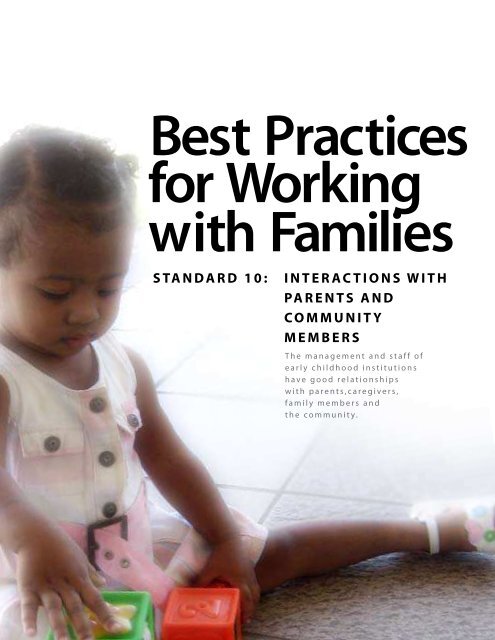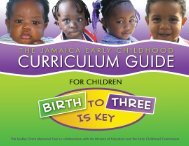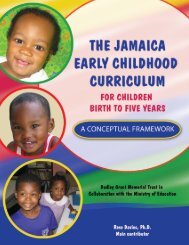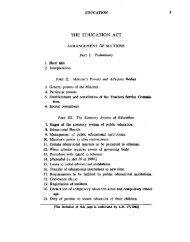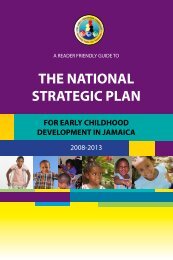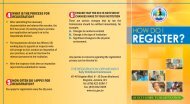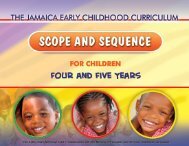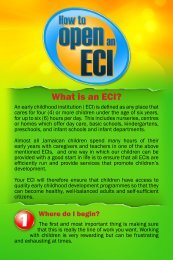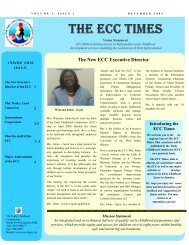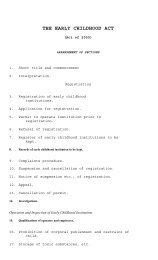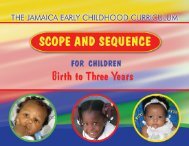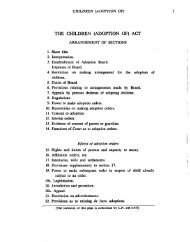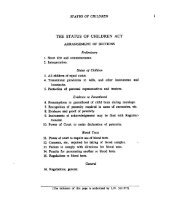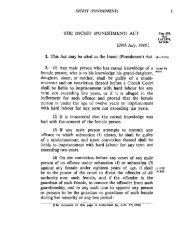Best Practices - The Early Childhood Commission
Best Practices - The Early Childhood Commission
Best Practices - The Early Childhood Commission
You also want an ePaper? Increase the reach of your titles
YUMPU automatically turns print PDFs into web optimized ePapers that Google loves.
B E S T P R A C T I C E<br />
I N A P P R O P R I AT E P R A C T I C E<br />
<strong>Best</strong> <strong>Practices</strong><br />
for Working<br />
with Families<br />
1<br />
2<br />
3<br />
All institution practices underline the fundamental<br />
principle that the family is the child’s primary source of love<br />
and care and the most powerful influence in the child’s life.<br />
For example, key messages and important written and verbal<br />
communication reflect the importance of partnerships with<br />
families.<br />
<strong>The</strong> institution demonstrates respect for diverse family<br />
systems and practices which include religious beliefs<br />
and practices.<br />
<br />
ECPs understand that family and community<br />
involvement is a means of expanding the child’s<br />
opportunities for learning and development.<br />
Institutions do not recognize the important<br />
role families/guardians play in the lives of their<br />
children.<br />
ECPs do not communicate in a verbal and<br />
written format with families in order to<br />
strengthen the partnership.<br />
<strong>The</strong> institution is not respectful of all family<br />
“types”. ECPs display a bias towards some family<br />
structures, cultural and religious<br />
practices.<br />
ECPs do not involve the community in the life<br />
of the school.<br />
S TA N D A R D 1 0 : I N T E R A C T I O N S W I T H<br />
PA R E N T S A N D<br />
C O M M U N I T Y<br />
M E M B E R S<br />
T h e m a n a g e m e n t a n d s t a f f o f<br />
e a r l y c h i l d h o o d i n s t i t u t i o n s<br />
h a v e g o o d r e l a t i o n s h i p s<br />
w i t h p a r e n t s , c a r e g i v e r s ,<br />
f a m i l y m e m b e r s a n d<br />
t h e c o m m u n i t y .<br />
4<br />
5<br />
6<br />
7<br />
<br />
<strong>The</strong> institution welcomes family participation in the<br />
<strong>Early</strong> <strong>Childhood</strong> Institution– meetings, fundraising, Board of<br />
Directors, PTA, cultural and social events and as volunteers<br />
in the <strong>Early</strong> <strong>Childhood</strong> Institution etc. An open door policy<br />
exists in the school.<br />
<br />
According to Standard 10, ECPs must meet once before<br />
the child starts attending the institution. Home visits allow<br />
ECPs to build strong relationships with new families. Parents<br />
are encouraged to spend time with their child in the ECI prior<br />
to their child’s entry into the school.<br />
<br />
<strong>The</strong> institution collects relevant information about the<br />
child and family, for example health records, through a<br />
planned orientation process.<br />
<br />
A parent orientation information booklet is provided for<br />
new families that include all of the critical and relevant<br />
information about the operation of the institution and is<br />
prepared by ECPs, principals and board members.<br />
<br />
ECPs act as experts discouraging family<br />
involvement in the school.<br />
<br />
ECPs do not meet with families before the<br />
child starts.<br />
<br />
<strong>The</strong> institution does not collect vital<br />
information on the child and the family.<br />
<br />
No family booklet is provided in order for<br />
families to understand the school’s expectations.<br />
8<br />
<br />
ECPs will find opportunities to recognize family<br />
contributions. A skills bank is established to record the<br />
expertise and interests of new families which can be used to<br />
enhance curriculum delivery, operations of the <strong>Early</strong><br />
<strong>Childhood</strong> Institution etc.<br />
<br />
No skills bank is established and families<br />
expertise is not acknowledged or utilized.<br />
9<br />
<br />
<strong>The</strong> physical environment appears welcoming, eg. signs<br />
are posted, inviting entrance ways. Families are made to feel<br />
welcome. An open door policy is in effect.<br />
<br />
<strong>The</strong> environment of the institution is not<br />
maintained and signage is not visible. Parents are<br />
not made to feel welcome at the ECI and are barred<br />
from freely entering.<br />
10<br />
Weekly curriculum is posted for families to review. A<br />
pictorial schedule is displayed to help parents and children<br />
understand the day’s events.<br />
<br />
No pictorial schedule is displayed. No weekly<br />
curriculum is posted.<br />
BIRTH TO THREE YEAR OLDS


